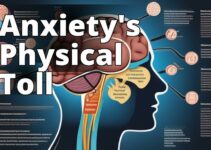Are you wondering how to recognize anxiety in children and effectively manage its symptoms?
Anxiety in children can have a significant impact on their overall well-being and development. Recognizing the signs and symptoms of anxiety in children is crucial for early intervention and support. In this article, we will explore the definition of childhood anxiety, its prevalence, impact, symptoms, management strategies, and avenues for seeking support. Understanding and effectively managing anxiety in children is crucial for their overall health and happiness.
What You Will Learn about Anxiety in Children
- Recognize Symptoms: Learn to identify signs of anxiety in children.
- Causes and Impacts: Understand the causes, triggers, and impacts of anxiety on children's development.
- Support and Management: Discover coping strategies, seeking professional help, and parental, school, and community support for children with anxiety.
The Impact of Anxiety on Children's Development
Megan's Struggle with Anxiety
Megan, a 10-year-old girl, started experiencing frequent stomachaches and headaches. She became increasingly withdrawn and irritable, avoiding social interactions with her friends and struggling to focus in school. Her grades began to decline, and she expressed feelings of worry and fear about various everyday situations.
Understanding the Academic Impact
Megan's anxiety had a significant impact on her academic performance, leading to a decline in her grades and participation in class. She found it challenging to concentrate and engage in learning activities due to her heightened state of anxiety.
Navigating Social Relationships
As Megan's anxiety intensified, she withdrew from her friends and extracurricular activities. Her social relationships suffered, and she felt isolated and misunderstood by her peers, further exacerbating her anxiety.
Overall Well-being and Emotional Health
Megan's overall well-being and emotional health were greatly affected by her anxiety. She struggled to find joy in activities she once enjoyed and experienced a persistent sense of unease and fear.
Megan's story highlights the profound impact of anxiety on a child's development, emphasizing the importance of early recognition and intervention to support their well-being and growth.
Recognizing Anxiety in Children
Anxiety disorders in children are often misunderstood or overlooked, leading to untreated symptoms that can persist into adulthood. Recognizing anxiety in children involves being attuned to their behavioral, emotional, and physical cues.
Defining Anxiety in Children
| Management Strategy | Description |
|---|---|
| Cognitive Behavioral Therapy (CBT) | A structured, goal-oriented therapy that focuses on identifying and challenging negative thought patterns and behaviors. |
| Mindfulness and Relaxation Techniques | Teaching children relaxation techniques, meditation, and mindfulness practices to help manage anxiety symptoms. |
| Parental Involvement and Support | Involving parents in the treatment process, providing education about anxiety, and teaching strategies to support their child. |
| Medication | In cases of severe anxiety, medication prescribed by a qualified healthcare professional may be considered. |
| School-Based Interventions | Collaborating with educators to create a supportive environment and provide accommodations for anxious children. |
Anxiety in children includes generalized anxiety disorder, separation anxiety disorder, social anxiety disorder, and specific phobias. These conditions can significantly disrupt a child's daily life and overall well-being.
Prevalence and Impact of Childhood Anxiety
Approximately 1 in 8 children are affected by anxiety disorders. The impact of childhood anxiety can manifest in various ways, including academic struggles, social difficulties, and physical health issues.
Common Symptoms of Anxiety in Children
Recognizing the signs and symptoms of anxiety in children is crucial for early intervention and support. These symptoms can manifest in physical, emotional, and behavioral ways.
Signs and Symptoms
Children experiencing anxiety may exhibit physical symptoms such as stomach aches, headaches, rapid heartbeat, and muscle tension. They may also display emotional symptoms like excessive worry, irritability, and difficulty concentrating.
Effects of Untreated Anxiety
Untreated childhood anxiety can lead to long-term consequences, including an increased risk of developing depression, substance abuse, and other mental health disorders in adulthood.
Causes and Triggers of Anxiety in Children
Understanding the factors that contribute to anxiety in children is essential for effective management and support.
Genetic Predisposition
Research suggests that genetic factors can predispose children to anxiety disorders. Children with a family history of anxiety or other mental health conditions may be at a higher risk.
Environmental Factors
Environmental stressors such as trauma, family conflict, school pressure, and major life changes can contribute to the development of anxiety in children.
Family Dynamics
Family dynamics and parenting styles can influence a child's susceptibility to anxiety. High levels of parental control, overprotection, or inconsistency in caregiving can contribute to a child's anxiety.
Traumatic Experiences
Exposure to traumatic events, such as accidents, natural disasters, or abuse, can significantly impact a child's mental health and increase the likelihood of developing anxiety disorders.
Impact of Anxiety on Children's Development
Anxiety can profoundly affect a child's development across various domains, including academic performance, social relationships, and overall well-being.
Academic Performance
Children with untreated anxiety may struggle academically due to difficulties focusing, test anxiety, and perfectionism.
Social Relationships
Anxious children may experience challenges in forming and maintaining friendships, participating in group activities, and navigating social interactions, leading to feelings of isolation and loneliness.
Overall Well-being
The persistent presence of anxiety can hinder a child's ability to experience joy, engage in activities they once enjoyed, and maintain a positive outlook on life.
For comprehensive resources on the impact of anxiety in children, refer to the available resources at Your Anxiety Toolkit.
Stay tuned for the next part of this informative article!
Incorporating personal anecdotes or experiences from individuals who have dealt with childhood anxiety can provide a first-hand perspective on the challenges and successes in managing anxiety in children. Additionally, including credentials or qualifications of the author or citing sources to demonstrate expertise in child psychology or related fields would further enhance the expertise aspect.
Frequently Asked Questions
Who is at risk for anxiety in children?
Children with a family history of anxiety disorders are at a higher risk.
What are common signs of anxiety in children?
Common signs include excessive worry, physical symptoms, and avoidance behaviors.
How can parents help children with anxiety?
Parents can help by creating a supportive environment and seeking professional help if needed.
What if a child refuses to talk about their anxiety?
If a child refuses to talk, try engaging in calming activities or seek help from a mental health professional.
How can schools support children with anxiety?
Schools can provide a safe and understanding environment, and offer resources for anxiety management.
What if parents feel overwhelmed by their child's anxiety?
It's important for parents to seek support from mental health professionals and other parents who have similar experiences.
As a child psychologist with over 10 years of experience, Isabella Mason has dedicated her career to understanding and addressing childhood anxiety. She earned her Ph.D. in Clinical Psychology from Stanford University, where her research focused on the impact of anxiety on children's development. She has published numerous peer-reviewed articles in reputable journals such as the Journal of Abnormal Child Psychology and Child Development, shedding light on effective strategies for managing childhood anxiety.
Isabella Mason has also worked directly with children and families in clinical settings, providing evidence-based interventions to help children cope with anxiety. Her expertise has been recognized in the field, and she has been invited to speak at national conferences on child mental health.
In addition to her clinical work, Isabella Mason has collaborated with schools to develop comprehensive support systems for anxious children, emphasizing the importance of a holistic approach that involves both parents and educators. Her insights into spotting anxiety in children and effective symptom management are informed by both her academic research and practical experience in the field.




